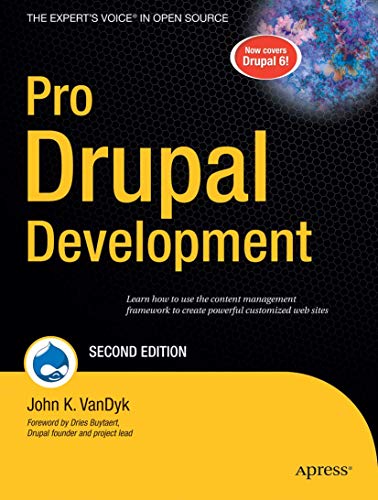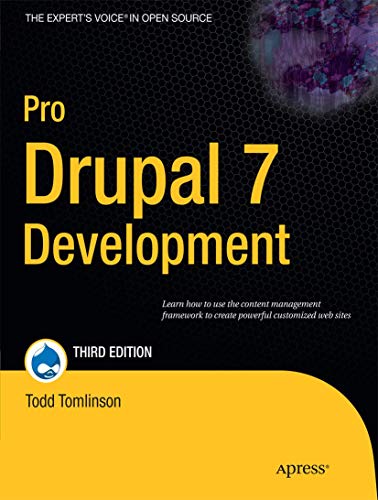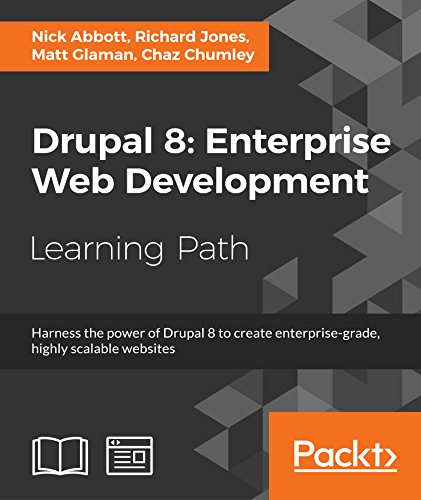Top products from r/drupal
We found 47 product mentions on r/drupal. We ranked the 34 resulting products by number of redditors who mentioned them. Here are the top 20.
1. Using Drupal, 2nd Edition
Sentiment score: 2
Number of reviews: 5
Used Book in Good Condition
 Show Reddit reviews
Show Reddit reviews3. Pro Drupal Development, Second Edition
Sentiment score: 5
Number of reviews: 4
Apress Pro Drupal DevelopmentWidely praised for its indepth coverage of Drupal internals, bestselling Pro Drupal Development has been completely updated for Drupal 6.
 Show Reddit reviews
Show Reddit reviews6. Drupal 7: the Essentials
Sentiment score: 2
Number of reviews: 2
Used Book in Good Condition
 Show Reddit reviews
Show Reddit reviews7. Drupal 8 Development Cookbook - Second Edition: Harness the power of Drupal 8 with this recipe-based practical guide
Sentiment score: 0
Number of reviews: 2
 Show Reddit reviews
Show Reddit reviews10. Drupal 7 Explained: Your Step-by-step Guide
Sentiment score: 1
Number of reviews: 2
 Show Reddit reviews
Show Reddit reviews11. Drupal: The Guide to Planning and Building Websites
Sentiment score: 1
Number of reviews: 1
Used Book in Good Condition
 Show Reddit reviews
Show Reddit reviews12. Planning and Managing Drupal Projects
Sentiment score: 0
Number of reviews: 1
Used Book in Good Condition
 Show Reddit reviews
Show Reddit reviews13. PHP Objects, Patterns, and Practice
Sentiment score: 0
Number of reviews: 1
PHP Objects, Patterns, and PracticePHP Books
 Show Reddit reviews
Show Reddit reviews15. Boards That Make a Difference: A New Design for Leadership in Nonprofit and Public Organizations
Sentiment score: 2
Number of reviews: 1
 Show Reddit reviews
Show Reddit reviews16. Web Database Applications with PHP & MySQL, 2nd Edition
Sentiment score: 1
Number of reviews: 1
Used Book in Good Condition
 Show Reddit reviews
Show Reddit reviews18. Leveraging Drupal: Getting Your Site Done Right
Sentiment score: 1
Number of reviews: 1
 Show Reddit reviews
Show Reddit reviews








The DA Board set the direction, the staff, of which has been cut down to bare minimum, execute. Well, the Executive Director executes what the Directors direct. The 'At Large' did help set the direction for a couple of years however in a podcast interview the Exec Director said this 'At Large' role was not for setting direction but to assist the DA staff in implementing the already set direction.
ATEOTD it's an 'Association' as in an association of businesses. Not a 'bad' thing as such, that's how industry works. Except F/LOSS is not just industry, it's a whole lot more than that and IMHO as a community we have a responsibility to support the community as a whole. One of the now-ex Directors of the DA recommended a book to me "Boards That Make A Difference" by John Carver:
https://www.amazon.co.uk/Boards-That-Make-Difference-Organizations/dp/0787976164
...which I duly purchased and read, which I can tell you was a task as my brain puts me to sleep if given too much intense stuff like that book so took a while but it's great stuff. He says about going back to the mission, which in the DA's case is/was/whatever to support the community and the project as a whole. Then you look at what they are doing to achieve that and consider whether those activities are indeed achieving that. I say they're not. The DA grew because Dries needed some official body to look after the money for events and the drupal.org site. Of course the drupal.org site doesn't make money but costs money, and anything invested in it is a cost (unless of course people are paying for sponsorship, ads, etc.). Then you have the events, and the profitable DrupalCon. So, no surprise DrupalCon grew. But does that really support the whole community? When I go to DrupalCons and meet people who go because they have given up trying to figure out their problems and have to travel, take time off work, all the costs etc. then I say a bigger review of the whole activities needs to be done. Of course we love conferences and all that, but IMO there needs to be a balance, and because the business side grew up by providing profitable support, the 'tools of the trade', i.e. *.drupal.org has been woefully neglected, for example forums which people have been campaigning for years to get some TLC but keep getting knocked back. So we end up fragmenting support across different channels, people using proprietary platforms like Slack etc. and a patching system that feels like something from the days of punchcards. Then because all the companies need their product, all the effort is going to teach people how to 'contribute', so all the work goes upstream.
When I mentioned the book to another board member I was poo-pooed with them saying "oh the Carver way, yeah, well some people subscribe to that". I just found whatever I said was shot down straight away whereas the opposite is what I find on the community/code side where 'generally' your points are taken as good intention to start and we discuss things.
Again, I'm not saying anyone has but the best intentions, they may, they may not, I'm just proposing that we haven't grown a system which supports the community that has been admirably grown, and when others like myself do suggest other, already proven in different industries, approaches we have little support. At first I thought this was my lack of communication skills but as time went on I realised it was more that I was trying to change the status quo - everyone's happily making money so who cares? But the effect of that is we end up with situations like this, where too much control is centralised and community support is sporadic across the world, generally gravitating to where it's best to do business. Which is not the whole story. We can, and I believe will, do better.
I guess I'd better stop ranting now ;)
It's true that many Drupal themes modify an existing theme, but it's done in a bit of a different way. The best way to do this is through the use of a sub-theme. The most popular theme to sub-theme from is probably Zen.
I personally have a heavily modified sub-theme of Zen that I start with for most clients. I use the 960 grid system with my own modifications as well. I use a sub-theme of this sub-theme to create the client's theme.
Why? Here's why:
While it may be easier on some level to hack an existing theme, it is prone to break during an update and/or harder to extend in the future. Sub-theming is actually pretty easy and eliminates both of those problems.
Best of luck learning Drupal. I love it. I sit on irc.freenode.net in #drupal and #drupal-support volunteering answering questions for whomever finds their way to the channel. I'd recommend that as the #1 resource (please search Drupal.org and Google for an answer first, obviously) but also this book was a huge benefit to me:
I actually bought it as an e-book so that I could copy/paste examples and use the search function to find my way around a lot easier when I needed to find a particular specification or help on a topic that the book was likely to have covered.
This is the book that everyone else recommends:
I haven't read it personally, but it does get a lot of support from the community. It was definitely written by some people that have a big role in what Drupal is. The authors are very helpful people.
You might also consider attending a Drupalcon event. The next one is in Chicago in March 2011.
Spend a couple of bucks on the Lullabot videos. They are invaluable. Particularly Drupal Module Development and Advanced Theming for Drupal will be focused on someone with your skill set. For free, a lot of goodness can be found at DrupalCon 2009 DC where most of the sessions have video available for free.
Pro Drupal Development, Second Edition or Using Drupal are excellent books on the subject that are not too far dumbed down.
One of the problems for experienced developers coming into Drupal is that Drupal has been extremely successful at turning point and clickers into architects for some very robust sites. So, the community has a lot of voices speaking to that audience. Look for a local drupal group such as the one in Nashville, TN that I am a part of. I will say this, Drupal has one of the most friendly communities out there, and one of the biggest skills to acquire working with Drupal is knowing when to build it yourself, and when to use something that's already been built (and on top of that, which module to pick when doing the latter.)
For some of the stuff your discussing in your post, look into the Services module and of course Views 2 also, being new I would suggest getting into Features because that will give you a great understanding of how to work with CCK and even build custom modules for dealing with those content types.
Let me know if I can help, I'll do my best to get some eyes on this post as well.
I came to Drupal from the ground-up, rather than top-down. After I got past the Drupal learning curve, I discovered a lot of flexibility and reusable components... and lots of anti-patterns. With that said, especially for the more popular extensions, there's a reason for their popularity. Just because it's different from what you're used to doesn't mean it's bad.
Do look for modules. Don't just install every module you find; figure out the functional requirements are and test critically.
Yes, there may be a module for it, but is it supported? How many people downloaded it? Is it actively developed? Does it even work? Does it conflict with anything?
If you can grok the 5 lines of code that you need from a throwaway contrib module to perform a task and add it cleanly as part of your custom code, just do it - comment to cite and move on.
Yes, there are plenty of UIs, and some of them are pretty horrid. First thing I do is disable overlay, for example. You don't have to use them.
There's drush, which is a fantastic CLI interface, which facilitates a lot of back-end tasks. I strongly recommend it.
http://www.amazon.com/dp/1430231351 is a great book for getting started with Drupal 7 development, not "site building".
Hang out in IRC, #drupal-contrib and #pantheon on freenode for example if you want to talk shop.
If you've got $45 to spare, I think your best bet is to sign up for a month of the Drupalize.me site. It's run by the guys and gals at Lullabot (one of the top Drupal dev shops) who have contributed in many ways back to the community. Lots of good tutes at the link above.
If you think it will be a permanent "position" so to speak, it can't hurt buying the books. The Bible for Drupal is the [Pro Drupal Development] (http://www.amazon.com/Pro-Drupal-Development-Second-Edition/dp/1430209895/ref=sr_1_3?s=books&ie=UTF8&qid=1332828253&sr=1-3) series. Note that link is for Drupal 6, there is also a D7 version available but I haven't perused it quite yet.
As far as needing an understanding, I think as long as you have a basic concept of the following, you should have a good start:
Hopefully that will get you started. If I think of anything else I'll edit this post. Good luck!
Welcome aboard! Looks like you've got some reading to do.
You might also consider installing Drush in your site hosting and development environments. It provides commandline tools to automate common tasks and is a great thing to have in your toolbox.
One thing I would stress is to not be in a hurry to write code when just getting started. If you're new to Drupal you may be surprised with how much you can accomplish without writing any code, especially if you use the right combination of contributed modules for the task at hand.
The videos available from Drupalize.me and BuildAModule.com cover a lot of stuff from beginner to deep-dive. (But have a price associated with them.)
NodeOne have a pretty extensive collection of (free) videos as well. Some of that stuff was used to put together the book Drupal 7: The Essentials which I thought was pretty good.
Two honestly self-promotional recommendations:
Aimed squarely at beginners, we've 100s of Drupal videos at http://ostraining.com/courses/categories/drupal and what's been the best selling Drupal book over the last 6 months: http://www.amazon.com/Drupal-Explained-Step---Step-Guide/dp/0133124231/
The Drupal 7 Visual Quick Start Guide (http://www.amazon.com/Drupal-7-Visual-QuickStart-Guide/dp/0321619218/ref=sr_1_1?ie=UTF8&qid=1322959794&sr=8-1) book from Peachpit Press helped me start learning very nicely. I borrowed mine from the library and was finished with it before it was due for return.
I also found installing VMWare Player and the Bitnami Drupal virtual appliance helped save a lot of time in getting started. With this, you don't have to install anything - the LAMP stack and Drupal come pre-isntalled and cofigured. Just start VMWare and open a browser. You're in!
Honestly, if you have minimal programming experience to begin with, you really should start with learning the basics. Pick a simple project (a few of my first included a tool to manage my Movies, a deck editor for Magic: The Gathering, and simple website, etc). Download WAMP/MAMP if you don't already have it and pick up a good resource book, and abuse php.net for learning what different things do.
I've recommended the first edition of http://www.amazon.com/Web-Database-Applications-PHP-MySQL/dp/0596005431/ref=sr_1_1?ie=UTF8&qid=1299603608&sr=8-1n before, but I don't know how the second stands up - perhaps worth a look.
Most importantly, if you don't have an understanding of HTML/CSS/Javascript - you won't understand all the different components that make up a web application. Invest heavily in learning the basic markup/css and a bit of javascript and you will be miles ahead of a lot of people who call themselves "developers" simply because they can remember the names of a dozen drupal functions.
I wrote a blog post once upon a time about this: http://drupalconnect.com/blog/how-learn-drupal
That said, I think it depends on how your mind works. Do you like to learn by doing? Or do you prefer to learn by reading and researching?
If by doing, just pick a site and start building it and ask questions in IRC or drupal.stackexchange.com or here as you go. You don't really need any prior info--just google "installing drupal" to get started, then click around for a bit and see how far you can get by doing that and googling things as you go.
If by reading, check out https://drupal.org/node/1576418 (free) and http://shop.oreilly.com/product/0636920010890.do as a start, then move on to http://www.amazon.com/Drupal-Module-Development-Matt-Butcher/dp/1849511160 when you're ready to start building custom modules.
And as always, feel free to ask questions here as you go, especially in this weekly thread. :) Hope that helps. I know it's a somewhat vague answer but I think it's a little difficult to nail down this topic since everybody's so different.
For drupal 6
For drupal 7
Both of these books (depending on which version of drupal you want to run) have great insight on how to properly build a module and what kinds of things to look out for.
I would recommend Matt Glaman’s Drupal 8 Development Cookbook. I found it to be a useful resource and also touches on the development process in Drupal 8.
https://www.amazon.com/Drupal-Development-Cookbook-Matt-Glaman/dp/1785881477
Videos and books to get you started:
https://www.youtube.com/watch?v=-DYSucV1_9w&list=PLtaXuX0nEZk9MKY_ClWcPkGtOEGyLTyCO
https://www.youtube.com/playlist?list=PLtaXuX0nEZk-Mer_a_P1sp0mroJGVs6TK
https://www.amazon.com/Drupal-Explained-Step-Step-Guide/dp/152099026X/ref=asap_bc?ie=UTF8
Videos and books on development:
https://www.ostraining.com/classes/drupal-8-development/
https://www.ostraining.com/class/d8-themes/
https://www.amazon.com/Drupal-Development-Cookbook-Matt-Glaman/dp/1785881477/
https://www.amazon.com/Drupal-Theming-Twig-Chaz-Chumley/dp/1782168737/
It might be worth reading the Acquia Exam materials to help guide your learning: https://training.acquia.com/study-guides
Using Drupal maybe?
If you have a lynda.com account, they have some Drupal tutorials (haven't used those in particular but they generally do good work)
Johan Falks book on how to learn Drupal 7 is also a good place to start.
http://www.amazon.com/Drupal-7-Essentials-Johan-Falk/dp/1463659717
This book might help fill in some of the blanks.
My recommendation would be http://smile.amazon.com/Using-Drupal-2nd-Angela-Byron/dp/1449390528/ref=sr_1_1?ie=UTF8&qid=1426873439&sr=8-1&keywords=using+drupal
That and working with your developers to have proper documentation for how the site is implemented, and how the end-user should be working with it. Every drupal site is different, just like every wordpress site is different.
this is book I am waiting for:
http://www.amazon.com/Using-Drupal-Angela-Byron/dp/1449390528/ref=sr_1_6?s=books&ie=UTF8&qid=1332872342&sr=1-6
Not out yet, but if you go to the o'reilly website, you can order an advanced copy from them though.
Besides that, the only books I have read was when I was just starting out and I quickly outgrew them. I wouldn't recommend either I have.
Go here for more book info: http://drupal.org/books. And since you want to build modules, take a look at api.drupal.org.
http://www.amazon.com/Drupal-Development-Experts-Voice-Source/dp/1430228385/ref=dp_ob_title_bk This book served me well
The non-helpful answer: Drupal has a crazy learning curve.
I'd highly recommend getting "Drupal 7 Module Development" by PACKT http://amzn.com/1849511160 and actually reading it... Do some work, then read over related chapters again. I come from a OOP background and structure a lot of my work in classes too. Drupal 8 is very MVC and OOP orientated
There's a second edition of the book that you'd want instead: https://www.amazon.com/Drupal-Development-Cookbook-recipe-based-practical/dp/1788290402/
I've used this one.
I found this very useful: http://www.amazon.co.uk/Drupal-Module-Development-Matt-Butcher/dp/1849511160
After I read "The Yellow Book" my Drupal skills were at a whole new level.
From your description of the book it sounds somewhat similar to the
Drupal 8 Development Cookbook I already have. I might stick to that for the time being.